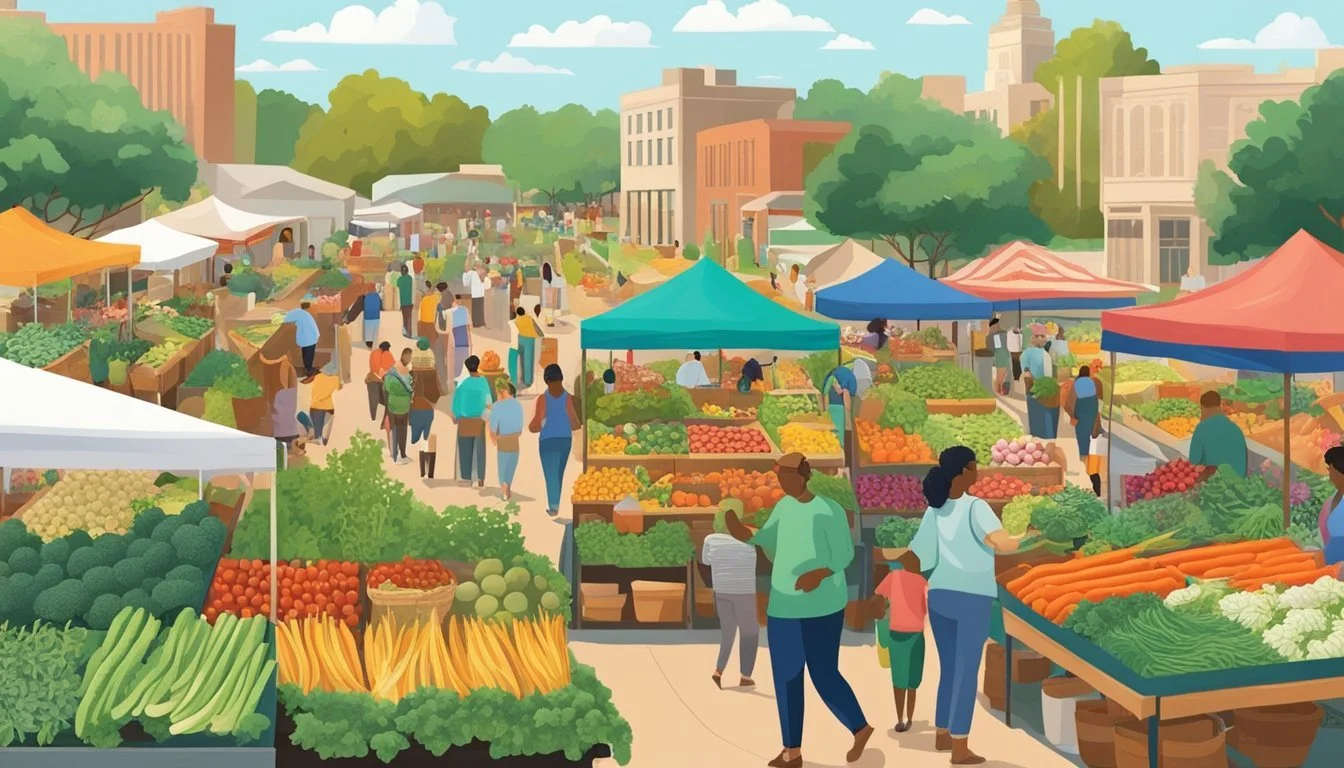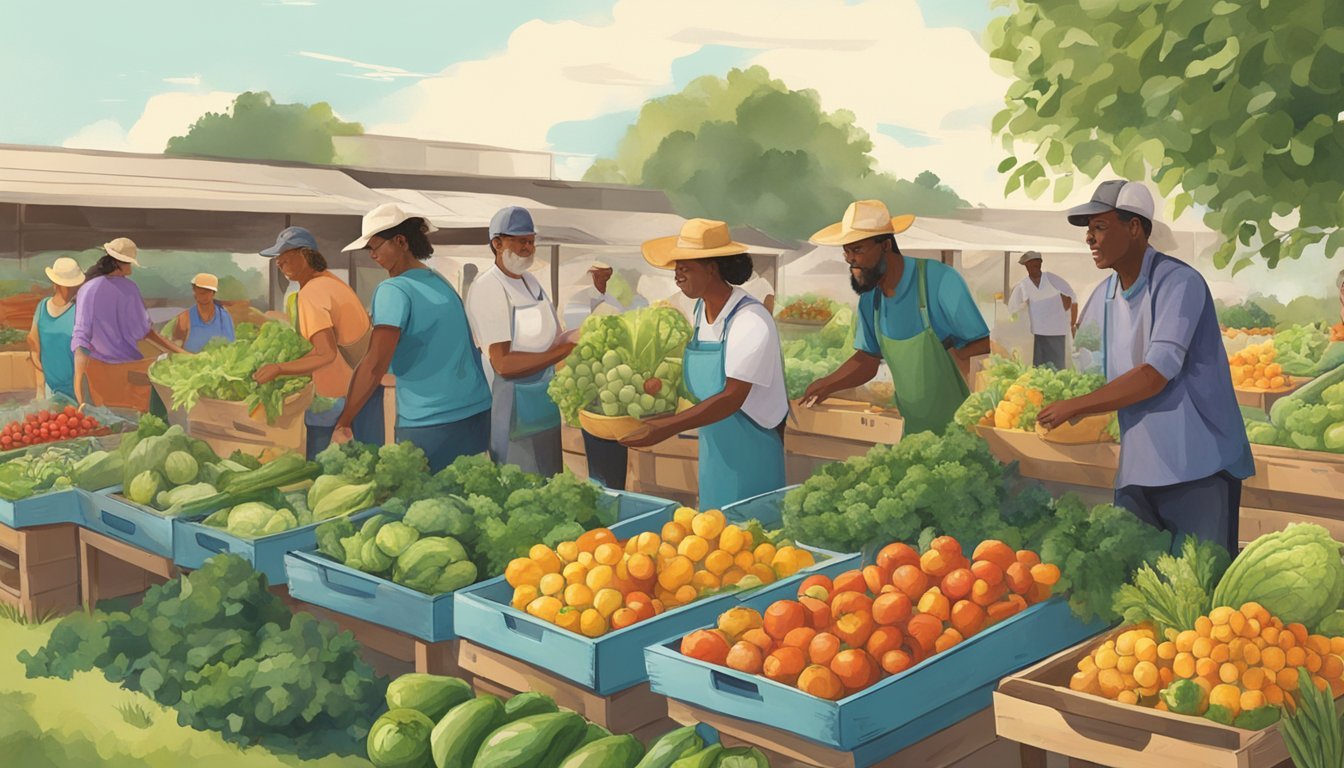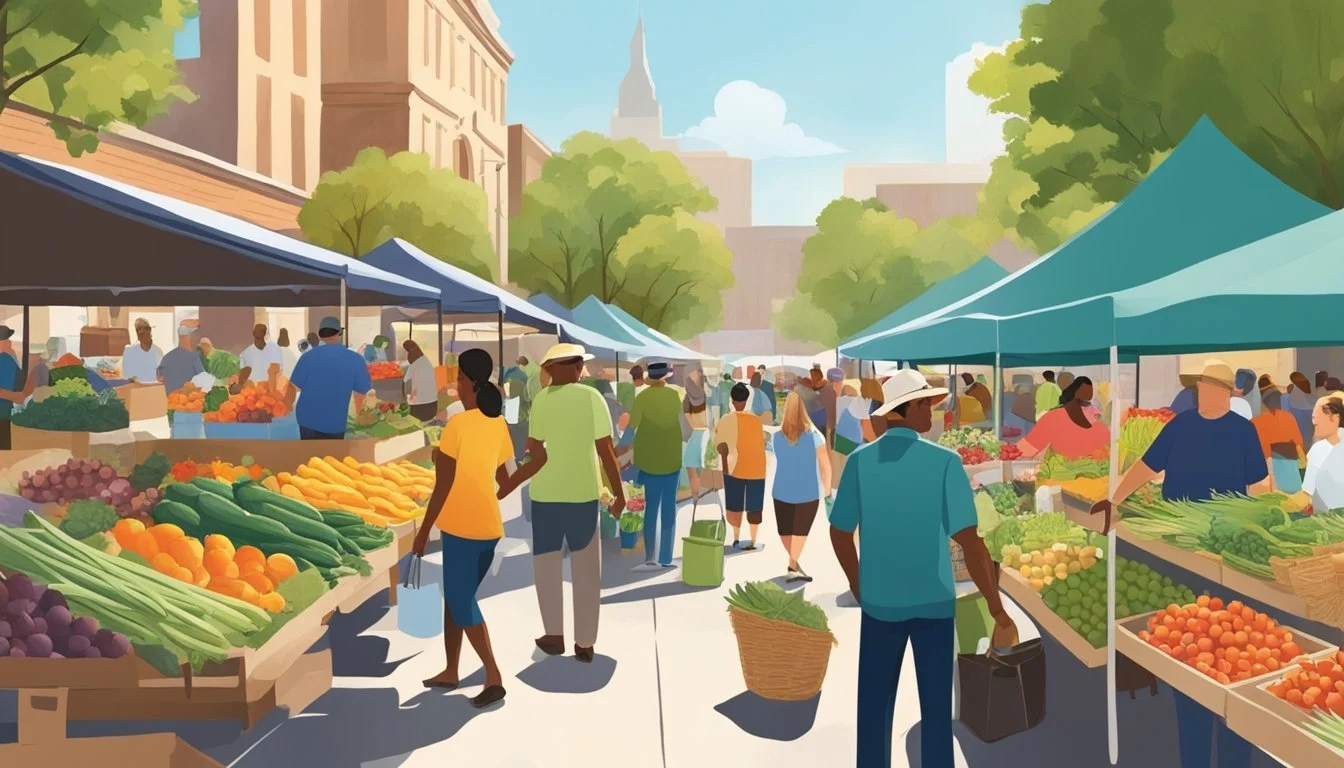Community Supported Agriculture (CSA) in Dallas, TX
A Guide to Local Farm Shares
Community Supported Agriculture, commonly known as CSA, is a form of direct farm-to-consumer sales model that is gaining momentum in Dallas, TX. This model allows consumers to buy seasonal produce directly from local farmers, fostering a closer connection between the people who grow food and those who eat it. By purchasing a share of the harvest upfront, CSA members support local agriculture and receive a regular supply of fresh, locally-grown produce throughout the farming season.
In Dallas, the CSA model is tailored to urban residents seeking to incorporate fresh and seasonal food into their diets. It supports the local economy, reduces the carbon footprint associated with long-distance food transport, and provides community members with the opportunity to learn more about sustainable farming practices. The range of products available through CSAs in Dallas not only includes fruits and vegetables but also extends to locally-raised meats and dairy products, thereby offering a comprehensive approach to community-based food consumption.
What is Community Supported Agriculture (CSA)?
Community Supported Agriculture, frequently abbreviated as CSA, is a farming model that connects local farmers directly with consumers. Members typically buy subscriptions, or "shares," ensuring they receive regular deliveries of locally grown produce. This system fosters sustainable farming practices while strengthening the local food economy.
Principles of CSA
Community Supported Agriculture operates on the foundational principle of reciprocal support between local farmers and community members. By paying for produce in advance, members provide financial security to farmers, enabling them to plan their seasonal operations with greater confidence. This partnership encourages:
Local Engagement: CSA promotes the consumption of local foods, which often leads to a reduction in food miles and a fresher, seasonal diet.
Sustainable Farming: With the CSA model, farmers are typically encouraged to use sustainable, environmentally friendly farming practices.
Shared Risk and Reward: Both the farmers and members share the responsibilities and benefits of the food production process, including variations in harvests due to weather or pests.
CSA Subscription Models
The most common CSA subscription model involves a seasonal membership, where consumers pay in advance for a season's worth of produce. This produce is usually delivered weekly in the form of a CSA box. Subscription models can vary, and some CSAs offer flexibility in membership periods and payment plans. The two main subscription models include:
Traditional CSA Model: Members pay for an entire season up-front. This investment helps cover the initial annual costs of the farm's operation.
Market-Style CSA: Members can sometimes choose their produce out of a larger assortment of goods, providing more flexibility and choice in what they receive.
By offering these subscription models, CSA fosters a stable market for local farmers and provides community members with a tangible connection to their food and its origins.
Benefits of Joining a CSA in Dallas
Joining a Community Supported Agriculture (CSA) program in Dallas confers multiple advantages ranging from bolstering local agriculture to reducing the carbon footprint associated with food transport. The CSA model facilitates a direct bridge between residents and the local farms that provide them with food.
Support for Local Farmers
By participating in a CSA, individuals give economic stability to local farmers in the Dallas area. Members usually pay in advance for a season’s worth of produce, which in turn allows farmers to plan and budget efficiently. This predictable income is crucial for small farm operations where every dollar counts.
CSA Memberships: Upfront payments provide essential funds for seeds and equipment.
Economic Resilience: Direct consumer support can help farms weather financial uncertainties.
Access to Fresh Produce
CSA members benefit from weekly deliveries or pick-ups of fresh, nutritious food. The produce is often organic and harvested at peak ripeness, ensuring maximum flavor and nutritional value. Members can enjoy a diverse array of produce including vegetables, fruit, and sometimes additional farm products like eggs.
Weekly Shares: May include a variety of:
Vegetables: Tomatoes, leafy greens, peppers, and more.
Fruit: Berries, peaches, melons, depending on the season.
Eggs and More: Some CSAs offer eggs, honey, and other farm-fresh items.
Environmental Impact
CSAs in Dallas contribute positively to the environment by focusing on sustainable farming practices. Local food systems require less transportation, reducing greenhouse gas emissions. Moreover, many CSAs use organic methods that minimize or entirely eschew the use of synthetic pesticides and fertilizers, which can be harmful to both the land and local ecosystems.
Sustainability: Emphasis on methods that protect the soil and water resources.
Reduction in Food Miles: Buying local cuts down on long-distance food transport.
Finding CSAs in Dallas
Finding Community Supported Agriculture (CSA) programs in Dallas connects residents with fresh, locally-grown produce and supports area farmers. These partnerships allow consumers to receive a regular share of a farm's harvest and often provide unique insights into the agricultural process.
CSA Directories
LocalHarvest is an excellent resource for discovering CSAs in the Dallas area. They offer a searchable database of local CSAs, which includes details such as produce varieties and pick-up locations. For instance, Everbloom Fields, featured on LocalHarvest, is known for its sustainable approach and community-oriented practices.
LocalHarvest Listings for Dallas, TX:
Eden’s Organic Garden Center - Provides a range of organically grown vegetables, fruits, and flowers.
Red Moon Farm - Offers fresh produce through its CSA program with a commitment to sustainable farming.
Additional local family farms and ranches are also listed, each with its unique offerings.
To use LocalHarvest, simply enter "Dallas, TX" in the search bar, and filter the results for CSAs to find the most suitable options for your needs.
Local Farmers Markets
The Dallas Farmers Market serves as a hub for area farms to sell their goods directly to the public. Many of these farmers also offer CSA memberships. By visiting the market, individuals can engage with farmers, like those from Eden’s Organic Garden Center or Red Moon Farm, to learn more about their CSA programs and the benefits of participating.
Key Points for Dallas Farmers Market:
Discover CSA programs from various participating farms.
Enjoy the opportunity to speak directly with farmers and producers.
Gain insights into where and how the produce is grown.
Visitors to the Dallas Farmers Market can find it at 1010 S. Pearl Expressway, Dallas, TX, and can inquire about CSA options during regular market hours.
Seasonal Offerings in Dallas CSAs
In Dallas, CSAs pride themselves on delivering fresh, sustainably grown produce directly to their members. The seasonal offerings reflect the region's climate and soil conditions, ensuring that the produce is at its peak of flavor and nutrition.
Summer Season Produce
During the summer months, Dallas CSAs are abundant with a diverse range of produce. Members can expect to receive:
Seasonal Greens: Fresh and vibrant greens like kale, spinach, and lettuce.
Tomatoes: A variety of tomatoes from heirloom to cherry, full of flavor.
Herbs: Aromatic herbs such as basil, cilantro, and parsley.
Fruits: Seasonal fruits including melons and berries, when available.
With the area's warm climate, these items are typically included in CSA shares from late spring through summer.
Winter Season Variety
The winter season doesn’t mean a scarcity in the Dallas CSA offerings. Members can anticipate:
Leafy Greens: Hardy greens that can withstand cooler temperatures, such as collards and chard.
Root Vegetables: A selection of roots like beets and carrots.
Squashes: Variety of winter squashes which could include butternut or spaghetti squash, known for their thick skins and long shelf-life.
Herbs: Winter-hardy herbs like rosemary and thyme remain available.
Winter CSAs tend to adjust their produce availability to ensure ongoing variety, integrating stored and greenhouse-grown items as necessary.
CSA Membership Details
Community Supported Agriculture in Dallas, TX, offers residents a way to purchase fresh, local produce directly from farmers. When one subscribes to a CSA, they’re buying a share of the crops for a season.
Cost of Shares
The cost of CSA shares in Dallas can vary, but they typically range from $540 to $700 for a season. Payment is usually required upfront to help cover the initial costs of the farm operation. This model of agriculture provides consumers with regular allotments of fresh produce while giving farmers a predictable income stream.
Pick-Up and Delivery Options
CSA members generally have the option to either pick up their shares at a designated location or choose a delivery service if offered by the farm. Some CSAs provide biweekly pickups, where subscribers collect their bounty of produce every other week. Delivery options may include an additional fee, but they offer the convenience of receiving fresh produce right at one’s doorstep.
Organic and Sustainable Practices
Community Supported Agriculture (CSA) in Dallas, TX emphasizes the importance of organic farming and the education of sustainable agricultural practices. These efforts contribute to environmental health, food safety, and the local economy.
Organic Farms in Dallas
Several local farms focus on sophisticated organic practices to provide fresh, pesticide-free, and non-GMO produce. Eden’s Organic Garden Center and CSA Farm is one such establishment that dedicates itself to offering organically grown fruits and vegetables. Consumers can rely on these farms for healthy, sustainably grown produce.
EverBloom Fields is recognized for growing flowers with sustainable techniques, reflecting a broader commitment to organic methodologies in the Dallas area.
Sustainable Agriculture Education
CSAs in Dallas do not only focus on the production of food but also prioritize educating the community about sustainable agriculture.
Educational farm tours at farms like Eden’s Organic Garden Center enable individuals to learn about organic farming practices firsthand.
These tours often include demonstrations of methods used to nurture the soil and conserve water, aiming to inspire visitors to adopt sustainable practices in their own gardens.
Dallas CSA farms play an instrumental role in educating their community about the practices of sustainable agriculture while providing access to organic farm produce.
Community Engagement and Events
Community Supported Agriculture (CSA) programs in Dallas offer more than just weekly shares of produce; they present unique opportunities for community engagement and education through various events and activities.
Farm Tours and Workshops
Eden’s Organic Garden Center is known for its educational farm tours, providing an insightful experience into the workings of a CSA model. These tours often highlight the journey from seed to table, aiming to deepen participants' understanding of sustainable agriculture. Additionally, they may host workshops on topics such as organic gardening techniques or seasonal planting strategies, enhancing the community's agricultural literacy.
Volunteering Opportunities
Volunteering with a CSA like Eden’s Organic Garden Center can be an enriching way to support local agriculture and learn first-hand about farm operations. Community members often have the chance to assist with planting, harvesting, and even packaging CSA shares. This not only serves as a valuable educational experience but also strengthens the connection between consumers and their food sources.
In these ways, Dallas CSAs foster a bond between residents and local farmers, encouraging a more sustainable and knowledgeable community.
Preparing CSA Produce
Upon receiving a CSA farm box, consumers can expect a range of fresh vegetables and other produce that bring farm-to-table flavor to their meals. Proper storage and handling can maximize shelf life and quality, while creative recipe ideas can showcase the produce's natural taste.
Storing and Handling
The first step in preparing CSA produce is ensuring that items are stored correctly to maintain their freshness and extend their shelf life. Leafy greens should be stored in the crisper drawer of the refrigerator in breathable bags, while root vegetables like carrots and beets do well in a cool, dark place. Tomatoes should be kept at room temperature away from direct sunlight, and herbs can be kept in a glass of water like a bouquet, either on the countertop or in the fridge.
Leafy Greens: Refrigerator crisper drawer, loose in breathable bags.
Root Vegetables: Cool, dark place; possibly a basket or box.
Tomatoes: On the counter away from sunlight; avoid plastic bags.
Herbs: Glass of water on the counter or in the fridge; snip ends and change water regularly.
Produce like apples should be stored separately, as they emit ethylene gas which can hasten ripening (and over-ripening) of other vegetables.
Recipe Ideas
CSA produce is known for its superior flavor, and simple recipes can help highlight its quality. A farm box full of fresh vegetables is perfect for making vibrant salads, roasted vegetable medleys, or hearty soups.
Salad:
Arugula, spinach, or mixed greens
Fresh herbs for garnish
Season with salt, pepper, olive oil, and a splash of vinegar or lemon juice
Roasted Vegetables: (What wine goes well with roasted vegetables?)
Carrots, potatoes, and onions
Toss with olive oil, salt, pepper, and any desired herbs
Roast until tender and caramelized
Soup:
Start with sautéed onions and garlic
Add chopped CSA vegetables like tomatoes, squash, and greens
Simmer with stock until vegetables are tender; season to taste
Using these methods and recipe ideas, consumers can enjoy the diverse range of flavors offered by locally-sourced CSA farm boxes.
Beyond Vegetables: Other CSA Products
While vegetables are a cornerstone of Community Supported Agriculture, many CSAs in Dallas, TX, have expanded their offerings. They now include various meats, dairy products, and even artisanal goods, catering to the diverse preferences of their members.
Meat and Cheese Offerings
Dallas CSAs often provide a selection of meat products including beef, pork, chicken, and occasionally game. They practice ethical farming methods, ensuring high-quality meat. Members could expect to see options like:
Grass-fed beef cuts
Free-range chicken
Heritage breed pork
Local cheese varieties are also featured, with some farms partnering with artisan cheesemakers to deliver:
Aged cheddar
Creamy goat cheese
Bold blue cheese
Local Artisan Goods
Community Supported Agriculture programs in Dallas don't stop at food. Flowers and functional crafts are also common in CSA shares. Members might receive:
Freshly-picked bouquets to brighten their homes
Functional crafts such as handmade soaps, beeswax candles, or pottery
These added products not only support local artisans but also provide a unique touch to the CSA experience.
Challenges and Considerations
In Dallas, TX, Community Supported Agriculture faces distinct hurdles related to climatic variances and participants' commitments. These key areas impact the stability and predictability of CSA operations.
Weather and Crop Variability
Dallas's weather patterns present challenges to CSA farms, especially in terms of growing seasons. The variability of weather conditions can lead to:
Unpredictable harvests: Unexpected cold snaps or extreme heat can damage crops.
Adjustment in shares: Crop yields may vary, thus affecting the quantity and assortment of produce available for CSA shares.
Commitment Expectations
In Community Supported Agriculture, the commitment from consumers to purchase CSA shares for a season is crucial. Two key considerations include:
Financial planning for farms: Advance purchase of shares supports farmers’ cash flow and agricultural planning.
Understanding CSA model: Shareholders must recognize that their commitment helps mitigate farmers' financial risks and supports sustainable practices.
Getting Involved in Dallas's CSA Movement
Community Supported Agriculture (CSA) presents an opportunity to support local farmers and enjoy fresh, seasonal produce in Dallas, TX. Those interested can either join an existing CSA or take a step further by starting one. Additionally, a selection of educational resources is available to deepen one's understanding of sustainable agriculture practices.
Starting Your Own CSA
For those looking to establish a CSA in Dallas, they must first create a master list of local farmers, producers, and potential members who share an interest in fresh, community-sourced food. It is essential to determine the structure of memberships and what will be included with each share. Interested parties can reach out to existing CSA coordinators for guidance. Contact information usually includes email addresses or phone numbers provided on CSA's web presence.
Educational Resources
Dallas offers various educational resources for prospective and current CSA members and farmers. Educational farm tours and workshops are great opportunities to learn more about sustainable agricultural practices and how CSAs benefit the community and local economy. These resources can also help in developing the necessary skills for successful CSA management. For additional information or to find a local CSA, individuals can consult a comprehensive list provided by Dallas community resources or agricultural extensions.












